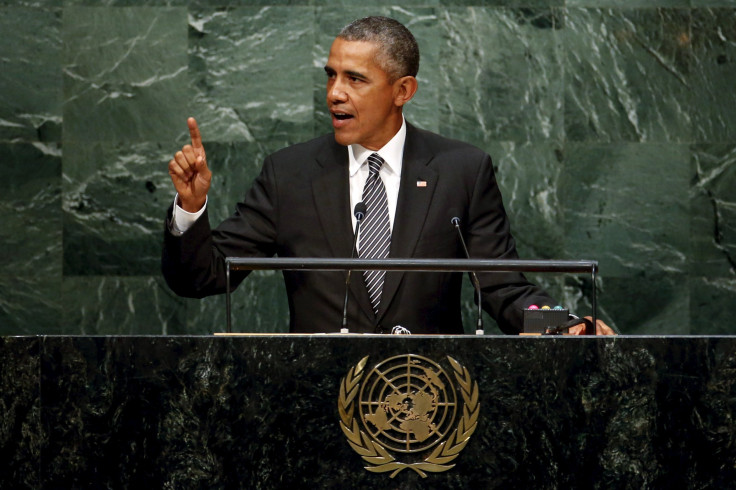Obama's United Nations General Assembly Speech To Call On World Leaders To Halt Aggressive Political Tactics

Despite a year of multiple political triumphs, including the Iranian nuclear deal and the easing of tensions between the U.S. and Cuba, President Barack Obama will still need to address two major foreign policy challenges that have no end in sight -- the European refugee crisis and the wars in Iraq and Syria -- during his speech at the United Nations General Assembly Monday.
Obama is expected to call on world leaders to work together to confront these crises by scaling back aggressive political tactics and embracing diplomacy. He will likely use the Iranian nuclear deal as an example of success.
In his remarks Sunday afternoon in New York, Obama began to give hints of what he may discuss Monday. During his remarks on global development, the president demanded leaders like Syrian President Bashar Assad to invest in their people and to provide stable governments.
"I profoundly believe many of the conflicts, the refugee crises, the military interventions over the years, may have been avoided if nations had truly invested in the lives of their people and if the wealthiest nations on earth were better partners in working with those trying to lift themselves up," Obama said Sunday.
But he will also need to address head-on areas where the U.S. has failed. In his speech last year, the president said that the Islamic State group, also known as ISIL, must be degraded and ultimately destroyed.
"The United States of America will work with a broad coalition to dismantle this network of death. In this effort, we do not act alone -- nor do we intend to send U.S. troops to occupy foreign lands. Instead, we will support Iraqis and Syrians fighting to reclaim their communities," Obama said in his speech in 2014. "We will use our military might in a campaign of airstrikes to roll back ISIL. We will train and equip forces fighting against these terrorists on the ground."
So far, though, the international coalition has yet to degrade or destroy the terrorist group, which to this day is still in control of large swaths of land in both Iraq and Syria, and now Libya. The train-and-equip program in Syria all but fell apart this year, and it has yet to be built up again.
Last year at the U.N. General Assembly, Obama also spent several minutes addressing Russia’s actions in Ukraine. But harsh words and sanctions have not slowed the conflict significantly.
Obama is set to meet President Vladimir Putin this week in New York to discuss the role of Russia in Syria, as well as the European refugee crisis.
"It is fair for you to say that based on the repeated requests we've seen from the Russians, that they are quite interested in having a conversation with President Obama," Josh Earnest, the White House press secretary, told reporters, according to the New York Times. He added that Obama decided "it was worth it at this point to engage with President Putin in a face-to-face meeting to see if the interests of the United States could be advanced."
© Copyright IBTimes 2025. All rights reserved.





















